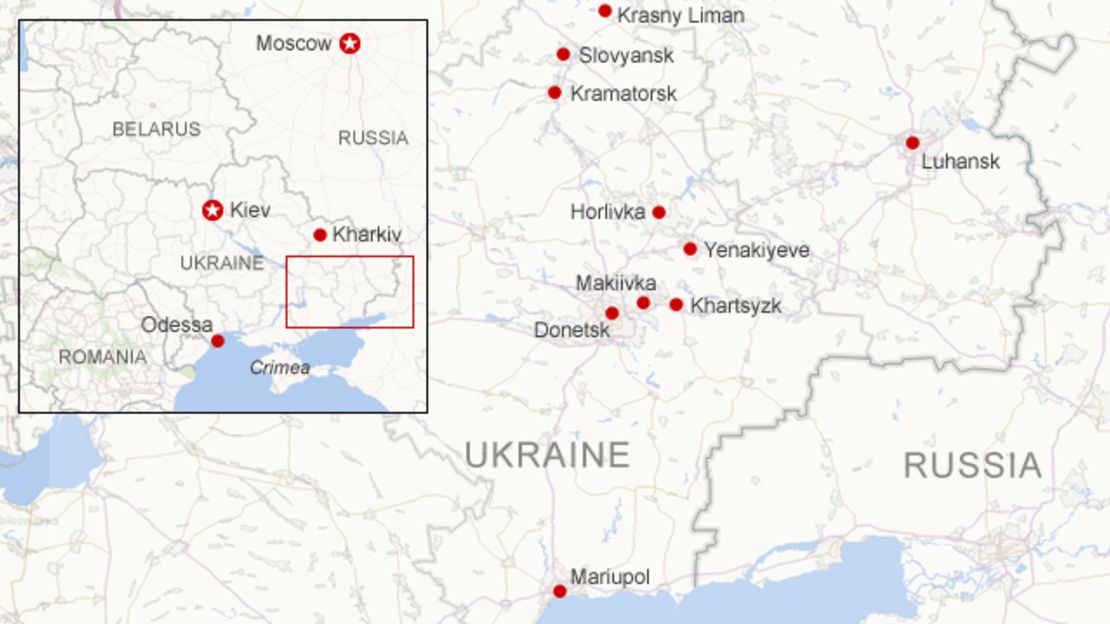Story highlights
NATO agrees to a package of support to help Ukraine defend itself
Russia's Federation Council cancels resolution authorizing use of troops in Ukraine
President Vladimir Putin asked for the step in light of peace talks, his spokesman says
John Kerry and other NATO foreign ministers are meeting in Belgium
Russia’s upper house of parliament voted Wednesday to revoke the right of President Vladimir Putin to use troops in Ukraine as efforts continue to calm a separatist uprising in Ukraine’s east.
The Federation Council had approved Putin’s request for a resolution allowing the use of force on March 1.
But Tuesday, Putin sent a letter to the speaker of the upper house seeking to cancel the resolution. One lawmaker voted against revoking the powers Wednesday, with 153 in favor.
Putin’s request was made in light of ongoing talks on how to settle the crisis in Ukraine’s eastern regions, said presidential spokesman Dmitry Peskov.
Russia and Ukraine have been engaged in a tense standoff since March when Russia annexed the previously Ukrainian peninsula of Crimea and massed troops along other parts of its border with Ukraine.
Ukraine’s new President, Petro Poroshenko, declared a cease-fire last week in Kiev’s fight against pro-Russia separatists in an effort to calm the situation.
The violence continued Tuesday when Ukrainian authorities said pro-Russia militants shot down a military helicopter in eastern Ukraine, killing nine.
However, peace talks involving representatives from all sides were under way Wednesday in the Ukrainian city of Donetsk, Ukraine’s official Ukrinform news agency said.
Those participating included Ukrainian government officials, pro-Russia separatists from the restive eastern Luhansk and Donetsk regions, Russian officials and members of the Organization for Security and Cooperation in Europe.
On Wednesday, U.S. Secretary of State John Kerry said the United States and Europe plan on additional sanctions against Russia, depending on what choices it makes ahead.
Asked if the parliament vote to revoke Putin’s power to use force in Ukraine was sufficient action to delay sanctions, Kerry said that he needed to see more.
The parliamentary action is a positive step, Kerry said, but it could be easily reversed.
The greatest difference will be made when Putin publicly calls for separatists in Ukraine to lay down their arms, Kerry said.
NATO chief: Peace plan a step forward
NATO foreign ministers on Wednesday endorsed a package of support strengthening the ability of Ukraine, which is not a member of the alliance, to defend itself.
Agreed to after talks in Belgium with Ukraine’s new foreign minister, Pavlo Klimkin, the package includes “the creation of new trust funds to support defense capacity building in critical areas such as logistics, command and control, cyber defense and to help retired military personnel to adapt to civilian life,” according to NATO.
“Ukraine has a clear vision for rebuilding its defense and security sector and a clear strategy for resolving the crisis,” NATO Secretary General Anders Fogh Rasmussen said.

Poroshenko’s peace plan is “a major step forward and we fully support it,” he added.
Rasmussen also called on Russia “to create conditions for the implementation of the peace plan, to end its support for separatist troops, and to stop the flow of weapons and fighters across its border.”
The meeting comes ahead of a NATO summit in Wales in September “at a time when security challenges are multiplying beyond our borders,” Rasmussen said.
“Today we stressed the importance of our collective defense.”
The ministers from the 28 NATO members – some of whom are former Soviet states whose nerves have been frayed by Russia’s actions against Ukraine – also agreed to maintain the suspension of practical civilian and military cooperation with Russia.
“There will be no business as usual with Russia until Russia comes back into line with its international obligations,” Rasmussen said.
Coordinated sanctions
Kerry met with Klimkin ahead of Wednesday’s talks.
Kerry also met Tuesday evening with EU foreign policy chief Catherine Ashton and representatives of other world powers, a senior State Department official said.
Kerry discussed their joint support for Poroshenko’s peace plan and the importance of preparing additional coordinated sanctions if Putin does not take further steps, the official said.
The United States and European Union have already imposed targeted economic sanctions against certain Russians and companies over Russia’s activities in Ukraine.
The resolution authorizing Russia to use force in Ukraine was passed three weeks before Russia completed its annexation of Ukraine’s Crimea region, which other world powers condemned.
Read: Ukrainian helicopter shot down days after cease-fire, official says
Read: Ukrainian border guards hurt in separatist attack on 1st day of cease-fire
CNN’s Alla Eshchenko reported from Moscow, and Laura Smith-Spark wrote and reported in London. Journalist Victoria Butenko and CNN’s Lindsay Isaac and Talia Kayali contributed to this report.





















































